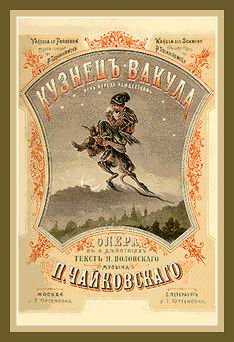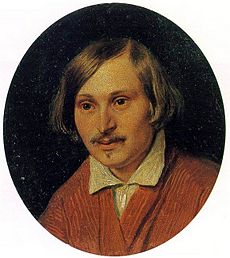Vakula the Smith facts for kids
Quick facts for kids Vakula the Smith |
|
|---|---|
| by Tchaikovsky | |

Cover of a piano reduction
|
|
| Native title | Russian: Кузнец Вакула |
| Librettist | Yakov Polonsky |
| Language | Russian |
| Premiere | 11 February 1869: Mariinsky Theatre, Saint Petersburg |
Vakula the Smith (Russian: Кузнец Вакула, romanized: Kuznéts Vakúla, lit. 'Smith Vakula' ), Op. 14, is a Ukrainian-themed opera in 3 acts, 8 scenes, by Pyotr Ilyich Tchaikovsky. The libretto was written by Yakov Polonsky and is based on Nikolai Gogol's 1832 story "Christmas Eve" (Russian: Ночь перед Рождеством, Noch péred Rozhdestvóm). It was written for composer Alexander Serov, who died in 1871 leaving only fragments of an opera on the subject.
Contents
Composition history
The opera was composed between June and 21 August 1874; it was begun during a holiday in Nizy (in Kharkov province) and finished in Usovo. The work was dedicated to the memory of the Grand Duchess Elena Pavlovna, who had died in 1873. When Tchaikovsky anonymously submitted the score for a competition under the motto "Ars longa vita brevis est" ("Art is eternal, life is short"), it won, and the composer received 1500 rubles. The opera was revised as Cherevichki (The Slippers) in 1885.
Performance history
The premiere took place in Saint Petersburg on 6 December [o.s. November 24] 1876 at the Mariinsky Theatre, conducted by Eduard Nápravník with stage direction by Gennadiy Kondratyev and set design by Mikhail Bocharov and Matvey Shishkov.
Roles
| Role | Voice type | Premiere cast St. Petersburg 6 December 1876 (Conductor: Eduard Nápravník |
|---|---|---|
| Vakula, a smith | tenor | Fyodor Komissarzhevsky |
| Solokha, Vakula's mother, a witch | mezzo-soprano | Anna Bichurina |
| A devil from Hell, a fantastic character | bass | Ivan Melnikov |
| Chub, an elderly Cossack | bass | I. Matchinsky |
| Oksana, Chub's daughter | soprano | Wilhelmina Raab |
| Pan Golova | bass | Osip Petrov |
| Panas, Chub's crony | tenor | V. Vasiliev |
| Schoolmaster | tenor | N. von Derviz |
| His Highness | bass | Fyodor Stravinsky |
| Master of Ceremonies | bass | |
| Attendant | tenor | Pavel Dyuzhikov |
| Old Cossack | bass | |
| Wood Goblin | bass | |
| Chorus, silent roles: Lads, lasses, elders, gusli-players, rusalki, wood-sprites, echo, spirits, court ladies and gentlemen, Zaporozhtsï | ||
The stage history of the opera was short. The opera was given 18 times over several seasons at the Mariinsky Theatre, but Tchaikovsky did not permit it to be performed at other theatres. Dissatisfied with the opera, Tchaikovsky revised it in 1885 as Cherevichki (The Slippers).
Instrumentation
Source: www.tchaikovsky-research.net
- Strings: Violins I, Violins II, Violas, Cellos, Double Basses
- Woodwinds: Piccolo, 2 Flutes, 2 Oboes, 2 Clarinets (B-flat and A), 2 Bassoons
- Brass: 4 Horns (all F), 2 Trumpets (F and E), 3 Trombones, Tuba
- Percussion: Timpani, Triangle, Tambourine, Cymbals, Bass Drum,
- Other: Harp
- On/Offstage: Wind Band (off)
Tchaikovsky's thoughts on the opera
- "All my thoughts are now intent upon my beloved child, darling Vakula the Smith. You would not imagine how I love him! It seems to me that I will positively go mad if I don't succeed with him" (Pyotr Tchaikovsky, from the letter to Anatoly Tchaikovsky May 12, 1875)
- "[There are] two fundamental shortcomings: first, the style of Vakula is not operatic, but symphonic; and the second, there is no correspondence between the music and what is taking place on stage... but the music of Vakula is almost without exception noble and beautiful with respect to both theme and harmony." (César Cui, Sankt-Peterburgskie vedomosti, November 30, 1876)
Related works
Some numbers were arranged for voices with piano or for piano duet (4 hands) by Tchaikovsky in 1874.
- Mykola Lysenko: The opera Christmas Night (1872—1883)
- Tchaikovsky: The opera Cherevichki (1885)
- Nikolai Rimsky-Korsakov: The opera Christmas Eve (1895)
See also
 In Spanish: Vakula el herrero para niños
In Spanish: Vakula el herrero para niños


